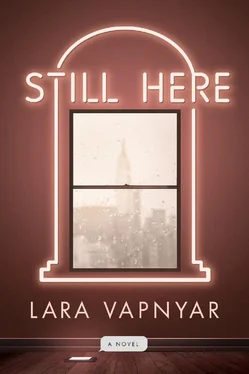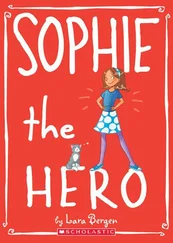The shame of having thought about that made Vica wince. She put her notebook down and looked out the window.
Staten Island seen from the bridge was at its most beautiful. Gone from view were the car dealerships, run-down storefronts, and stretches of cemeteries; all you could see were the magnificent green hills, the stretches of sand, the ocean, and the gentle contours of the Manhattan skyline on the horizon. The city looked pale, ethereal, and seemingly unreachable, yet Vica knew that in a mere forty minutes the bus would be right in the middle of it, squeezing down the loud, jam-packed streets between the looming robust buildings that were actually anything but ethereal.
The Bing Ruskin Cancer Center took up several blocks and was growing with impressive speed. There were three new construction sites visible from the bus stop. There were several hotels for patients and their families who came for treatments. There was a huge medical-supply store that sold everything from wheelchairs to chemo hats. There was even a grocery store that specialized in whatever items were touted as cancer fighting at the moment. This rampant capitalist ingenuity filled Vica with both disgust and awe. No commercial possibilities of sickness and death were overlooked there. The only thing that was missing was posthumous care. She thought that if she ever succeeded in creating her version of Virtual Grave, Bing Ruskin would be the very place to market it. Right now its services ended when its patients’ lives did, but it didn’t have to stop there. Why not keep making money off patients even after they were dead?
The building that housed the radiology department of BR was two blocks away from the bus’s second stop in midtown. It took Vica exactly six minutes and twenty seconds to get there. As always, there was a line of large gray vans by the entrance. They belonged to a company that brought in Medicaid patients from Brooklyn and Queens. All the drivers were Russian and they knew that Vica was too, so they liked to chat her up whenever she passed them. One of them, Tolik, always offered her a treat — a Russian candy or a handful of sunflower seeds, or once even a dill pickle.
There he was in the driver’s seat of his van. Fat, sweaty, with a wide smile half hidden behind his long bushy mustache.
“Hey, Vicusha!” he yelled, blowing a raspberry in her direction. Tolik liked to behave like an idiot, but at times he would say something that made Vica think of it for days. He had once shown her the route map for his bus with the stops where he was supposed to pick up patients marked with black asterisks. “See what I got?” he had asked. “The cancer map of Brooklyn.”
This time he just gave her a candy called Belochka, Vica’s favorite, chocolate and nuts with a little squirrel on the wrapper.
The lobby of BR radiology was enormous and filled with light. There was a fountain in the middle with a few little fish in it. In the corner behind the fountain was a small group of teenage girls in green cheerleader outfits practicing their routine.
Fight it,
Beat it,
Go all out to Defeat it!
Christine had told Vica that the girls were juniors from expensive private schools who thought that volunteering at a cancer hospital would look good on their college applications. They were part of the new emotional health program.
Vica winced at the girls and walked down the long hall to the elevator. Once inside she was greeted by the words BING RUSKIN #1! And her own smiling face. Last year, Vica had been picked as one of the eight employees to represent the diverse population of Bing Ruskin on a poster. Vadik said that they picked her because she was the prettiest one. But Vica thought it was because she was one of the few radiology technicians who was white. The administration didn’t want to support the cliché that most of the doctors at Bing Ruskin were white, most of the nurses Hispanic, and most of the technicians black (even though this was certainly true), so for the poster they had decided to include one black and one Indian doctor, two Asian nurses, and Vica — a white radiology technician. They were all holding something that looked like a blown-up business card that said BING RUSKIN RATED #1! Vica had to reach for the card from behind the substantial shoulder of Dr. Gupta, so it appeared as if she was pinching rather than holding it. Her smile didn’t come out that great either. “You look rather menacing here,” Vadik said when she showed him the photo. “Vica Morozova — the face of cancer!” But then he asked her for a copy so that he could hang it up in his bedroom. Vica didn’t know whether he was joking or not. Vadik had been acting weird lately. Reluctant to help her with Virtual Grave, annoyed when she asked him for dating advice, vague on the subject of Sergey. Not that she cared. Sergey was on his own now.
Sometimes the center’s personnel or even patients riding the elevator with her would recognize her from the poster.
“That’s you, isn’t it?” they’d ask, excited, as if they had just encountered a celebrity. “Bing Ruskin number 1!” she’d respond and pump her fist in the air, and they would laugh with delight. Vica hated when that happened, so she tried to stand in the darkest corner of the elevator. But from there her stare would be inevitably drawn to the elevator’s board where the passing floors were being lit with a soft neon glow, as if illuminating everything that might go wrong with a person. Cancers of the digestive system, urological cancers, gynecological cancers, and the scariest of them all — pediatric cancers. The radiology department was on the ninth floor, with medical radiology offices on the right side and diagnostic radiology on the left. The walls of the entire hallway were covered with inspirational quotes. Her least favorite was by Willa Cather: “Where there is great love, there are always miracles.” The quote itself was okay, but it struck Vica as cruel and unfair in this setting. What about terminal patients? There weren’t any miracles for them. Did that mean that the love in their lives wasn’t great enough?
Her favorite quote belonged to John Cheever: “My veins are filled, once a week with a Neapolitan carpet cleaner distilled from the Adriatic and I am as bald as an egg. However I still get around and am mean to cats.” Vica thought that if she ever got cancer she would find this sort of quote uplifting. She would make sure to be mean to cats.
It was hard not to become morbid at her job. Just the other day one of her patients said to her: “I used to think cancer was this singular tragedy, something exclusive, something shameful, like an embarrassing curse. Now I think it’s kind of inevitable, like one of the expected phases in your life. You get born, you go to school, you get a job, you get married, you get cancer, you die.”
Vica shared it with Christine. “Well,” Christine said, “if that’s how it is, then at least we’re better off than most people, because we know what to expect.”
There weren’t any patients yet. Early mornings were usually slow, but Vica knew that the hallways would get crowded by ten thirty and overcrowded right after the lunch break.
Liliana was sitting in an armchair in the waiting room, leaning over a stack of postcards.
“Hey, Vica, do you know how to spell condolences, c-e-s or s-e-s ?”
“With the c, I think,” Vica said. “Why?”
“I’m writing Dr. Jewell’s notes. To the families of the dead ones. They have to be handwritten. You know how people like a personal touch.”
“So she picked you to do her personal touch for her?”
“I have the best handwriting!” Liliana bit on the tip of the pen. “You know what, I don’t trust condolences, I better stick with ‘Sorry for your loss.’ ”
Читать дальше












